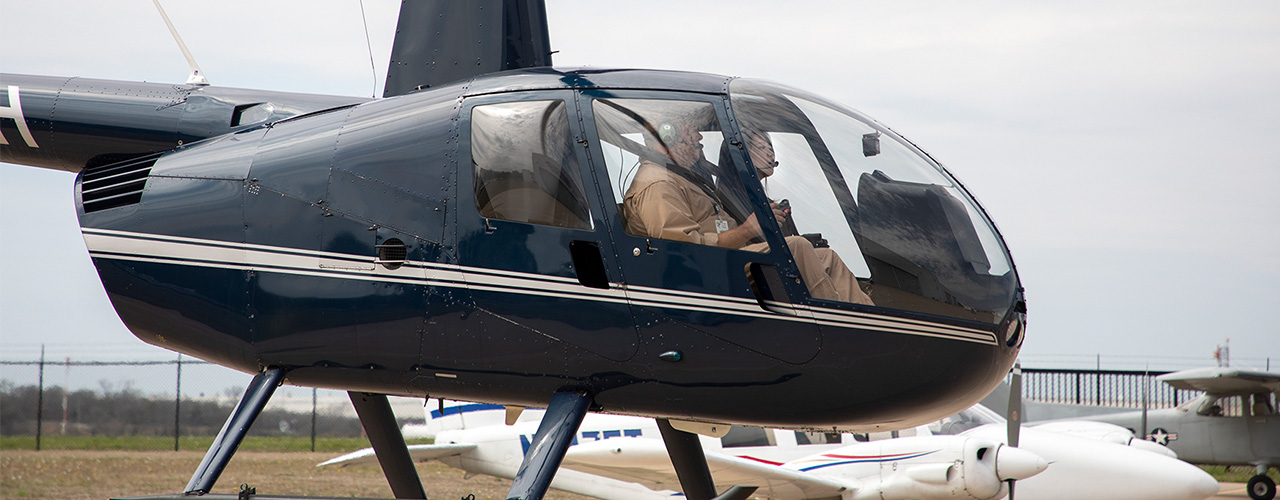Sky-High Dreams
TCC's Professional Pilot Program Helps Craig Love Realize a 20-Year Dream—to Fly Helicopters
TCC’s Professional Pilot Program, grounded by the Novel Coronavirus in the Spring, has taken off once again. It couldn’t have come sooner for Craig Love, who needed to log in a few more flight hours to complete his Certified Flight Instructor—Helicopter rating.
Love will thus finally realize a dream going back to his 20 years in the U.S. Army, which included duties in and around helicopters, but not flying them. “I got bit at a pretty young age and knew it was something I’d really, really like to do,” he said, “but I wore glasses, and you had to have 20/20 vision to be a pilot.”
It was kind a fluke. On a lark, one day I drove out to Alliance because I knew the program was there. They were having a briefing (an orientation for newly enrolled students)—the last one before classes began—and Joan Murali, the admin who really makes things happen for the flight program, asked if I wanted to sit in and listen. By the end, I was saying, ‘OK, let’s get started.’ I have a really strong faith, and it was almost as if I was directed to go there that day.
Craig Love
TCC Professional Pilot Program Graduate
The vision requirement was eventually eased, but by then Love was older than the 32-year maximum age for pilot training, but 12 years after leaving the military, he discovered TCC’s program.
“It was kind a fluke,” he said. “On a lark, one day I drove out to Alliance because I knew the program was there. They were having a briefing (an orientation for newly enrolled students)—the last one before classes began—and Joan Murali, the admin who really makes things happen for the flight program, asked if I wanted to sit in and listen. By the end, I was saying, ‘OK, let’s get started.’ I have a really strong faith, and it was almost as if I was directed to go there that day.”
Love began by earning a Private Flight rating and then started moving up the ladder--Instrument Flight, Intermediate Flight and Commercial Flight before tackling the highest rating of Certified Flight Instructor. It’s been a long haul, but not by choice. As a veteran, like most of the helicopter students, he depends heavily on financial aid and on his Veterans Administration benefits, which aren’t always immediately available.
 Program costs fall into two categories. Ground classes, covering everything from meteorology
to navigation to aviation law, are taught by TCC faculty at normal tuition and fee
rates. Hands-on flight training is provided under contract by two vendors—one each
for airplane (fixed-wing) and helicopters—at going rates, which are high, but competitive
with private flight schools. The estimated flight fees for Love’s current program,
for example, total $12,530.
Program costs fall into two categories. Ground classes, covering everything from meteorology
to navigation to aviation law, are taught by TCC faculty at normal tuition and fee
rates. Hands-on flight training is provided under contract by two vendors—one each
for airplane (fixed-wing) and helicopters—at going rates, which are high, but competitive
with private flight schools. The estimated flight fees for Love’s current program,
for example, total $12,530.
“It’s kind of scary when a board member or my president looks at the cost,” said Clint Grant, dean of Aviation, Business and Logistics at TCC Northwest, “but I have to remind them that they’re not comparing us to welding or culinary arts.”
Actually, as the only community college in Texas offering a pilot training program, TCC is a bargain for those determined to fly, thanks to the much lower cost of ground courses. Then, too, most students take the two additional courses toward needed for the Associate of Applied Science degree, an especially rigorous popular option for airplane students eyeing careers with major airlines.
The Professional Pilot Program is not only expensive, but also academically rigorous. “You’ve got to be dedicated,” said Program Chair Chad Weigand. “There’s a vast amount of coursework, and there’s nothing they’re learning that they’ll never use again. Everything they’ll learn, they’ll use throughout their entire career.”
Love agrees and adds that the flying part is no snap, either. “An airplane, by its very nature, wants to fly,” he said. “A helicopter does not. A helicopter beats the air into submission. One of our instructors, Joe Gonzalez, says that hovering is like trying to juggle while bouncing on a basketball that’s sitting on top of another basketball. It’s really tough.”
Perhaps, but many students once they begin flying in the first semester, are captured by the experience. “It’s like a virus, in a way,” Weigand said, “in that the only cure is to keep flying.”
Just ask Love, who was eager not only to finish the program, but simply to be aloft again. “You think back centuries to stories of how man tries to free his bonds from the earth and fly through the sky,” he said. “I love being in the air. I love the solitude of flying.”
This free-spirited passion, Weigand said, seems to be more prevalent in the helicopter jockeys than airplane pilots. “They seem to just want to get out there and do flying,” he said. “They don’t want to be stuck behind a bunch of rules.”
Love puts it somewhat differently. “Do you know the difference between a helicopter pilot and a savings bond?” he asks, a twinkle in his voice. “The savings bond eventually matures.”
To learn more, see TCC's Professional Pilot Program or contact Chad Weigand, program director, at 817-515-2128.


![//parameter[@name='author']](/magazine/assets/images/authors/bill-lace.jpg)